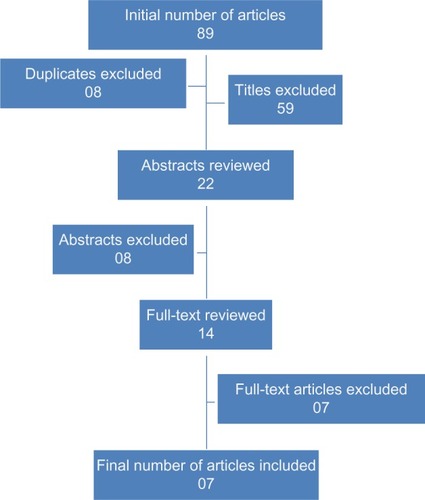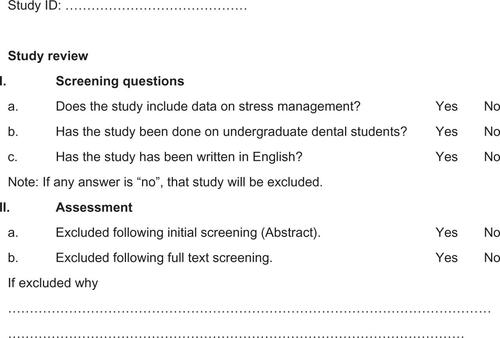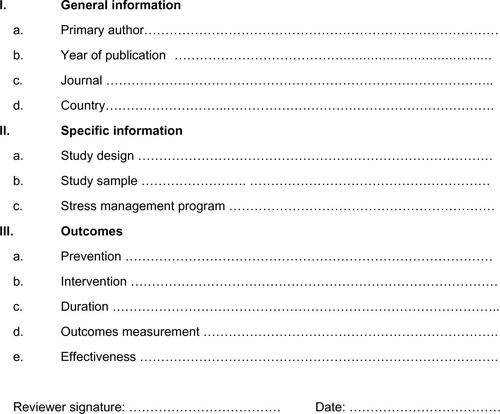Abstract
This study compared the effectiveness of stress management programs in dental education by systematic review of the literature. The number of studies concerning stress management programs for dental students is limited compared with studies discussing sources of stress. Several types of programs for stress management have been reported, and differ in their duration, content, and outcomes. Two main strategies have been used to help stressed students, ie, decreasing the number of stressors and increasing the ability to cope with stress. The first strategy includes several components, such as reducing fear of failure and workload pressure due to examinations and requirements. The second strategy includes coping techniques, such as deep breathing exercises. Although positive effects have been reported for most of the programs, these have mainly been evaluated using subjective self-report measures. There is a need for more research to identify the most effective stress management program.
Introduction
Dental students have a 100% prevalence of stress.Citation1 Perception of stress is due to the tendency of dental students toward perfectionism based on their history of high achievement and excellence in previous schooling and the fact that excellence is the norm in dental school.Citation2 The effect of year of study on stress levels has been found to be significant, with the third year of the 5-year curriculum considered the most stressful.Citation3 Increasing stress may result in decreased student performance.Citation4 Stress can be a significant threat and have a detrimental effect on the physical and/or mental health of students.Citation5 Stress may also harm the trainee’s professional effectiveness by decreasing attention, reducing concentration, impinging on decision-making skills, and reducing the ability to forge good clinician-patient relationships.Citation6
In relation to the serious side effects of stress among students in the health professions, more than two decades ago Tisdelle et al reported the deficiency in stress management research and programs available for dental students.Citation7 This observation has not been adequately addressed, despite numerous reports of the negative consequences of stress and recommendations to develop stress management programs for intervention and prevention. Although there is a large body of literature on stress management, its specific application to dental education has been largely unexplored. Compared with studies reporting the sources of stress, the number of studies discussing the prevention or management of stress in dental education is limited. However, a few researchers have studied the specific effects of stress management programs in dental education and some have provided empirical data.
Thirty-eight sources of stress in five groupings have been identified, being stressors related to living accommodation, stressors related to personal factors, stressors related to educational environment, stressors related to academic work, and stressors related to clinical factors.Citation5 Prevention and intervention procedures have been classified in six categories.Citation5 Apart from these, one study done in India recommends that parents should be advised not to force their children to study something against their will,Citation8 because they found that fear of facing parents after failure is a major source of stress, particularly in that part of the world.
Summarizing the literature, stressed students can help by either decreasing the number of stressors or by increasing their coping skills with regard to stress.Citation9 Decreasing the number of stressors can be achieved in several ways, such as reducing fear of failure and workload pressure due to examinations and course requirements.Citation9 In addition, the content of the dental curriculum could be reduced or its design changed.Citation10 Clinical requirements can be reduced or deleted to decrease the number of stressors.Citation9 Dodge et al found lower levels of stress among students in a clinical program based on patient needs than in students in a clinical program based on requirements. Further, students in programs without requirements have higher productivity and academic performance.Citation11 Increasing the length of the curriculum in order to lower students’ workload can help, and may also reduce their fear of failure.Citation9 Stress caused by uncertainty during transition periods can be reduced by scheduling sessions for exchange of information between students and their classmates from one year ahead, which can be a good source of information for their juniors.Citation9,Citation12
Increasing students’ ability to cope with stress is also important, and may help them in their future professional activities. Kay and Lowe suggest implementing stress management and wellness courses for students.Citation13 Topics such as coping with stress, time management, and choosing realistic goals could be addressed. Moreover, overall wellness should be emphasized by discussing the importance of sleep, diet, exercise, and other stress relievers like yoga and meditation. Positive outcomes have been observed among dental and medical students in previous studies.Citation14–Citation17
The purpose of the present study was to systematically review the literature to identify stress management programs in dental education and to determine their effectiveness. We focused on programs that provided students with coping techniques, such as meditation, hypnosis, imagery, and muscle relaxation, education regarding the psychological and physiological effects of stress, affiliation with peers, opportunities for emotional expression (support groups), and intensified relationships with faculty. After review of the literature, we discuss the implications of integration of stress management into dental education, provide practical suggestions for decreasing and alleviating stress, and make suggestions for future research.
Methods
This systematic review was conducted after approval of the protocol by the institutional review board at the King Abdullah International Medical Research Center. Two reviewers (AMA, AHA) evaluated studies on stress management in dental students for inclusion. The aim of the evaluation was to assess the quality of the studies as objectively as possible. Assessment of quality included the study design, sampling (size and technique), the outcomes measured, and the reliability and accuracy of the data. The authors assessed the rigor of the selected studies according to the availability and quality of the study design, study sampling, response rate, measurement tool, and stress management program.
Selection of studies
The literature search primarily involved a search of PubMed (NLM), Library of Congress, LISTA (EBESCO), and Web of Science (TS). The key words used in our literature search were “dental”, “dentistry”, “education”, “management”, “stress”, and “students”. To narrow our search, the key words were combined by using AND as follows: “dental students stress management”, dental AND students AND stress AND management, dental AND undergraduates AND stress AND management, dental AND students AND stress, dental AND undergraduates AND stress, dental AND education AND stress, dental AND education AND stress AND management, dentistry AND stress AND management. The reference lists of retrieved articles were also checked. Further, experts in stress management and behavioral psychology were contacted and asked about stress management programs for students. The citations identified in the electronic search were downloaded into EndNote X2, while those retrieved from other sources were entered manually (eg, hand searching, reference lists). Duplicates were deleted and a unique identification was assigned to each citation (author name and year of publication) on the review form.
A review form was designed (see Figure S1) to help determine which papers should be included in the study. A paper was included if it was published in the English language between January 1966 and November 2013, included undergraduate dental students, and investigated or discussed any stress management program. When the information provided by the title and abstracts was found to be relevant to the present research, or when this information was insufficient to decide on inclusion, the full text article was retrieved and evaluated. All remaining articles were read in their entirety and a final selection was made.
Data were extracted from the selected studies using a data extraction form (see Figure S2). The data extraction form included questions organized in three categories: general information (primary author, year of publication, country, journal); specific information (study design, study sample, stress management program); and analysis of outcomes (prevention, intervention). The review and data extraction forms were tested in a pilot study of a small number of papers. Based on the findings of the pilot, the forms were revised prior to use for identification of the articles included in the present study.
Procedure
The two reviewers (AMA, AHA) reviewed all the articles; the primary investigator was a consultant in dental services, program director, and a PhD student in a medical education program, and the other was a dental consultant interested in stress among dental professionals and students. The reviewers used the review and data extraction forms, and in case of a difference of opinion between the two reviewers, an expert was consulted to resolve the matter.
Data analysis
The results of the selected studies were combined and the findings reported most frequently were identified and summarized in tables. Aspects of stress management were categorized according to whether they were prevention or intervention programs. The results of all the papers included were reviewed to identify duplicate data, and a table was developed that included all aspects of stress management.
Results
Most of the literature addressing stress in dental students focused on the sources of stress and factors influencing the level of stress, such as gender and other demographic variables. Despite the call for stress management among dental students, only a small number of articles were found that discussed programs for managing these stressors in undergraduate dental students.
The initial electronic search by key words revealed 89 papers; after excluding duplicates and irrelevant papers by review of titles, this number was reduced to 22 (). The reviewers went through these 22 papers by reading the abstract, and after checking if the papers measured the effects of stress management programs in dental students, the number of papers was reduced further to 14. After reading the full text of these 14 papers, more papers were excluded according to the selection criteria, finally leaving seven papers for analysis (see Table S1).
Four of the studies selected were controlled trials,Citation18–Citation20 the fifth was a cross-sectional survey, the sixth was a case report, and the seventh was a systematic review addressing stress in dental students.Citation1,Citation5,Citation21 The selected studies discussed different stress management programs, ranging from a short program to (one 60-minute session) a rather intensive program (60–90-minute sessions). Five of the selected studies reported intervention programs for stress management and the other two reported prevention programs.Citation1,Citation5,Citation18–Citation21 For six of the seven programs, the authors reported significant effects on stress reduction; however, no significant effect was found in one study.Citation18
The stress management programs used varied in type, in that there were programs that trained students in specific relaxation strategies or techniques (ie, deep breathing, progressive muscle relaxation, Synchro-Energizer, yoga),Citation1,Citation18,Citation19,Citation20 other programs that introduced an interpersonal approach to dentistry (ie, faculty advising system, counseling system, study and test-taking skills program, stress management workshop),Citation21 and another program using multiple stress management seminars.Citation7
Outcomes of the stress management programs were measured using multiple measurement tools including the Visual Analog Scale,Citation18,Citation19 Spielberger State-Trait Anxiety Inventory,Citation18–Citation20 COPE questionnaire,Citation18 Dental Environment Stress questionnaire,Citation1 Expectancy,Citation7 Stress Knowledge Inventory,Citation7 Profile of Mood States,Citation20 Observer Rating Inventory,Citation20 and Thurstone Temperament Schedule and Stanford Stress questionnaire.Citation20
The variety of the stress management programs () indicated that there are as yet no gold standards for the duration of such programs or the tools that can be used to assess their outcome. There are no stress management programs that deal with all sources of stress known from the literature.
Table 1 Summary of selected studies
Discussion
The aim of this study was to identify stress management programs in dental education, and to determine their effectiveness. To this end, we undertook a systematic review of the literature. Seven articles were selected and reviewed, but only four showed significant stress reduction using the suggested stress management programs. In almost all programs, the participants found them useful.
The number of studies discussing the content and effectiveness of stress management programs for dental students is limited, compared with studies discussing the sources of stress among dental students. The stress management programs reported in the literature for medical students were also limited, and included self-hypnosis, meditation, mindfulness-based stress reduction, changes in the “pass/fail” grading system, feedback on various health habits, educational discussion, and changes in the length and type of curriculum provided.Citation22 There were other studies discussing stress management programs, but these do not focus on dental students specifically. Online stress management programs are effective if participants enjoy these, and have been shown to be more easily accessible and more cost-effective than traditional programs.Citation23–Citation25 Cognitive-behavioral stress management programs have been shown to be effective in reducing dysfunctional thought and decreasing stress.Citation26,Citation27 These general observations regarding stress management programs could be used to design programs specifically for dental students.
Different types of programs addressing stress management in dental students have been reported, but differ in their duration, content, and effect. These programs are either single or multiple sessions and contain relaxation techniques or information about stress. The shortest stress management program was a one-hour session, while the longest consisted of six 60–90-minute sessions. The stress management programs reported either helped to reduce the number of stressors or enhance stress coping skills, using relaxation techniques such as deep breathing and yoga. Stress management programs focused on stress prevention attempted to decrease the impact of stressors through stress awareness lectures.
The reported stress management programs did not follow one concept, and used either one measure or a combination of measures. For instance, some studies suggested improvement of the inter-professional relationship skills to reduce stress among dental students or used yoga; and the other studies used the Synchro-Energizer and Progressive Muscle Relaxation techniques, or combination of awareness and stress reduction exercise in multiple sessions. Most of these programs were liked by the students, helped them to manage their stress, and do not follow a gold standard. Hence, we recommend a program with easy application for students and dental schools, where students can achieve high outcomes with the least expenditure of time and effort.
The huge impact of stress on dental students indicates a need for stress management programs in dental education. Such programs could be introduced in dental curricula; for example, by recruiting a clinical psychologist for dental students in dental schools. Based on our review, the following considerations should be incorporated into future research: rigorous study design, including randomized controlled trials; more detailed study of varying durations and frequencies of interventions (eg, single-session versus multiple-session programs); more objective outcome measures than self-reports; and the effects seen on long-term follow-up.
A limitation of this research might be the small number of studies selected for review. Therefore, future studies are needed to study the effectiveness of stress management programs for dental students.
This review highlights the importance of stress management programs, the promising start made by those already implemented and investigated, and the unexplored territory that must be charted if these interventions are to efficiently and effectively succeed in the twin goals of benefiting future dentists and their patients and establishing a sound scientific base for future research.
Supplementary material
Table S1 Reference checklist
Disclosure
The authors report no conflicts of interest in this work.
References
- AhmadMSMd YusoffMMAbdul RazakIStress and its relief among undergraduate dental students in MalaysiaSoutheast Asian J Trop Med Public Health2012424996100422299483
- SandersAELushingtonKSources of stress for Australian dental studentsJ Dent Educ199963968869710518206
- AlzahemAMVan der MolenHTDe BoerBJEffect of year of study on stress levels in male undergraduate dental studentsAdv Med Educ Pract2013421722224159265
- WestermanGHGrandyTGLupoJVMitchellRERelationship of stress and performance among first-year dental studentsJ Dent Educ19865052642673457830
- AlzahemAMvan der MolenHTAlaujanAHSchmidtHGZamakhsharyMHStress amongst dental students: a systematic reviewEur J Dent Educ201115181821226800
- ShapiroSLShapiroDESchwartzGEStress management in medical education: a review of the literatureAcad Med200075774875910926029
- TisdelleDAHansenDJSt LawrenceJSBrownJCStress management training for dental studentsJ Dent Educ19844841962026371085
- AcharyaSFactors affecting stress among Indian dental studentsJ Dent Educ200367101140114814587679
- DahanHBedosCA typology of dental students according to their experience of stress: a qualitative studyJ Dent Educ20107429510320145064
- BrandAAStudent attitude to dentistry in South African Dental schoolsJ Dent Assoc S Afr1997527137209588998
- DodgeWWDaleRAHendricsonWDA preliminary study of the effect of eliminating requirements on clinical performanceJ Dent Educ19935796676728408898
- WestermanGHGrandyTGOcantoRAErskineCGPerceived sources of stress in the dental school environmentJ Dent Educ19935732252318454777
- KayEJLoweJCA survey of stress levels, self-perceived health and health-related behaviours of UK dental practitioners in 2005Br Dent J200820411E1918535535
- PauAKCroucherREmotional intelligence and perceived stress in dental undergraduatesJ Dent Educ20036791023102814518841
- Newbury-BirchDLowryRJKamaliFThe changing patterns of drinking, illicit drug use, stress, anxiety and depression in dental students in a UK dental school: a longitudinal studyBr Dent J20021921164664912108944
- FreemanRDental students in Northern Ireland in 1992 and 1995: changing trends in psychological stressStress Med200016233238
- MorseZDravoUStress levels of dental students at the Fiji School of MedicineEur J Dent Educ20071129910317445006
- Piazza-WaggonerCACohenLLKohliKTaylorBKStress management for dental students performing their first pediatric restorative procedureJ Dent Educ200367554254812809189
- ShankarapillaiRNairMAGeorgeRThe effect of yoga in stress reduction for dental students performing their first periodontal surgery: a randomized controlled studyInt J Yoga201251485122346066
- HowardCEGrahamLE2ndWycoffSJA comparison of methods for reducing stress among dental studentsJ Dent Educ19865095425443528255
- SchwartzRMEigenbrodeCRCantorOA comprehensive stress-reduction program for dental studentsJ Dent Educ19844842032076585388
- ShiralkarMTHarrisTBEddins-FolensbeeFFCoverdaleJHA systematic review of stress-management programs for medical studentsAcad Psychiatry201337315816423446664
- MorledgeTJAllexandreDFoxEFeasibility of an online mindfulness program for stress management – a randomized, controlled trialAnn Behav Med201346213714823632913
- WilliamsAHagertyBMBrasingtonSJClemJBWilliamsDAStress gym: feasibility of deploying a web-enhanced behavioral self-management program for stress in a military settingMil Med2010175748749320684452
- KawaiKYamazakiYNakayamaKProcess evaluation of a web-based stress management program to promote psychological well-being in a sample of white-collar workers in JapanInd Health201048326527420562501
- MoeiniBHazaveheiSMHosseiniZAghamolaeiTMoghimbeigiAThe impact of cognitive-behavioral stress management training program on job stress in hospital nurses: applying PRECEDE modelJ Res Health Sci201111211412022911962
- LeungSSChiangVCChuiYYMakYWWongDFA brief cognitive-behavioral stress management program for secondary school teachersJ Occup Health2010531233521079374



